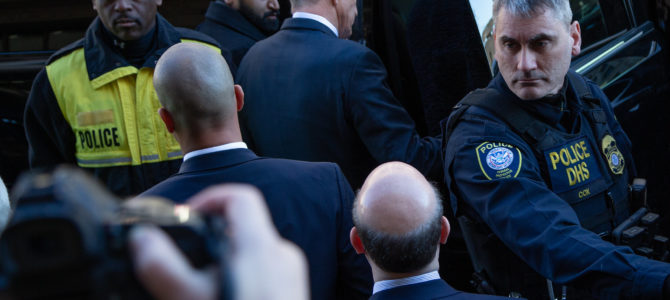
On Sept. 25, in a highly anticipated ruling, federal judge Anthony Trenga tossed the guilty verdict a Virginia jury returned in late July against Michael Flynn’s former Flynn Intel Group (FIG) partner, Bijan Rafiekian. Following a six-day trial, federal prosecutors convinced a jury to convict Rafiekian of acting as an unregistered agent of Turkey, conspiring to act as an unregistered agent of Turkey, and conspiring to make willful and material false statements and omissions in a Foreign Agents Registration Acts (FARA) filing. But after hearing the same evidence, Judge Trenga concluded that the jury acted unreasonably and entered a judgment of acquittal in Rafiekian’s favor.
The reaction from the right was swift. “Judge Trenga penned a thorough and brilliant decision that is correct on the law and the facts,” Flynn’s attorney Sidney Powell told The Federalist. “This was another case without a crime—brought by prosecutors who were willing to criminalize innocent behavior in furtherance of their own agenda,” Powell added.
Trenga’s opinion confirms Powell’s take. While the government sought to portray Rafiekian as an agent of Turkey, the court found no “rational juror could find” that Rafiekian knowingly acted—or caused others to act—on behalf of the Turkish government. Not only was there “no evidence of any actual or implied agreement between Rafiekian and the government of Turkey or any official of the government of Turkey,” the court stressed that Rafiekian had only one contact with Turkish officials, which occurred during a brief September 2016 meeting. And nothing said at that meeting suggested Rafiekian agreed to operate at the behest of Turkey officials.
The court also rejected the government’s attempt to cast Kamil Elkin Alptekin and his Dutch company, Inovo, as intermediaries for Turkey, finding instead that while Rafiekian agreed to work for Alptekin and Inovo, there was no evidence that Rafiekian had also agreed to act as an agent of Turkey. (Prosecutors also indicted Alptekin, but his case has yet to be brought to trial because he remains in Turkey.)
Also lacking, according to Judge Trenga’s opinion, was any evidence that Rafiekian conspired with Alptekin or anyone else “to either avoid filing under FARA or to cause the filing of a false FARA registration statement.” Here, the court stressed that “Rafiekian consulted with two law firms concerning his obligation to register under FARA,” and had disclosed to U.S. officials Alptekin’s connections to Turkey’s officials.
The government has the right to appeal Judge Trenga’s order of acquittal, but as a back-stop, the judge held that if his decision is overturned, Rafiekian is entitled to a new trial. The next step now is for the government to decide whether to appeal or cut its losses.
While government attorneys weigh that decision, the public would be well served to contemplate the lesson learned from Trenga’s decision to toss the case against Rafiekian, an American citizen whom in years past President George W. Bush had nominated, and the Senate had confirmed, to serve on the board of directors of the Export-Import Bank of the United States.
Is the problem a vague and ambiguous FARA? Or is the problem a political prosecution premised on nothing better than “impermissible speculation and conjecture?” Or maybe both?
To Powell, “this prosecution was the extension of Mueller’s abuses and those of the National Security Division who grossly expanded their power and corrupted the FISA process.” She has a cure, telling The Federalist, “The National Security Division of the DOJ needs to be completely cleaned out and reconstituted with people who are dedicated to protecting the Fourth Amendment and individual rights instead of trampling them.”
In the meantime, Powell remains committed to defending Flynn in a D.C. federal court. While Flynn had pleaded guilty more than a year ago to making false statements to the FBI, Powell continues to fight for access to evidence the government withheld from Flynn and his prior attorneys. With that evidence, Powell hopes to present a case for full dismissal of the charges against Flynn for egregious prosecutorial misconduct. But first, presiding Judge Emmett Sullivan must decide whether to allow Powell to access that evidence.
It will be some time before Flynn knows his fate, but Judge Trenga’s decision surely buoyed his spirits, as several passages confirmed that there was no conspiracy and Flynn bore no criminal liability over supposedly conspiring to commit FARA violations—something federal prosecutors have been suggesting in stride since Powell took over his defense.
No “rational jury could conclude that Rafiekian conspired with Alptekin or anyone else,” Judge Trenga wrote in his analysis of the FARA charge. Rather, “there is no evidence of discussions or suggestions, let alone an agreement express or implied, to either avoid filing under FARA or to cause the filing of a false FARA registration statement.”
Judge Trenga’s opinion also counters the media-contrived conventional wisdom that Turkey funneled funds to Flynn through the FIG. “There is no evidence, direct or otherwise, sufficient to reasonably infer that Turkey funded the engagement of FIG,” Judge Trenga wrote.
Flynn and Powell are likewise likely finding comfort in the dedication to detail and the rule of law Judge Trenga put on display in his 39-page opinion—something Judge Sullivan is sure to notice as well.









